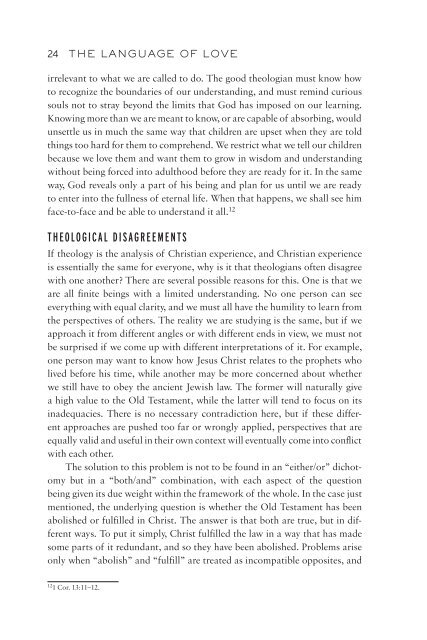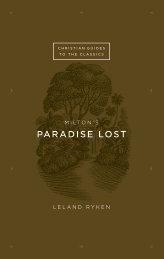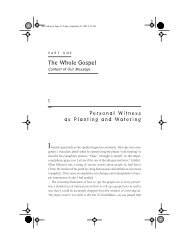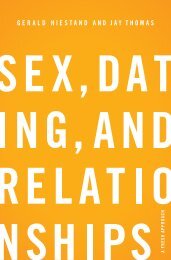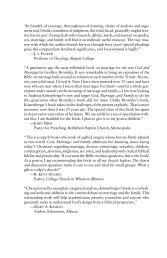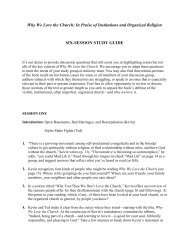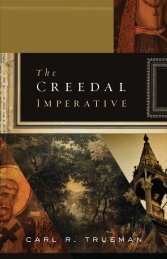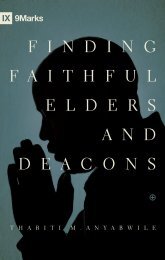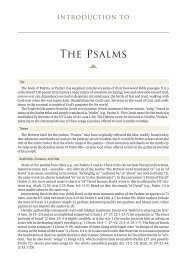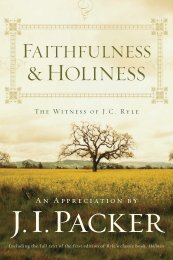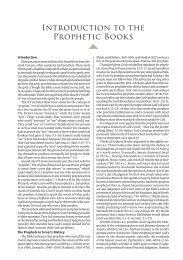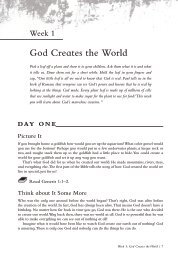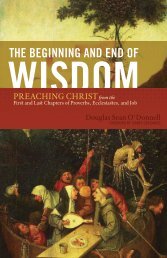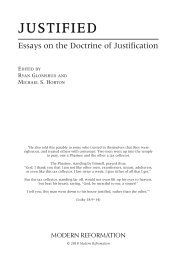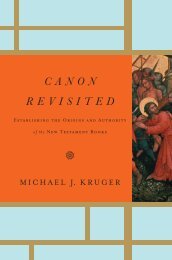Read an Excerpt - PDF - Monergism Books
Read an Excerpt - PDF - Monergism Books
Read an Excerpt - PDF - Monergism Books
You also want an ePaper? Increase the reach of your titles
YUMPU automatically turns print PDFs into web optimized ePapers that Google loves.
24 THE LANGUAGE OF LOVE<br />
irrelev<strong>an</strong>t to what we are called to do. The good theologi<strong>an</strong> must know how<br />
to recognize the boundaries of our underst<strong>an</strong>ding, <strong>an</strong>d must remind curious<br />
souls not to stray beyond the limits that God has imposed on our learning.<br />
Knowing more th<strong>an</strong> we are me<strong>an</strong>t to know, or are capable of absorbing, would<br />
unsettle us in much the same way that children are upset when they are told<br />
things too hard for them to comprehend. We restrict what we tell our children<br />
because we love them <strong>an</strong>d w<strong>an</strong>t them to grow in wisdom <strong>an</strong>d underst<strong>an</strong>ding<br />
without being forced into adulthood before they are ready for it. In the same<br />
way, God reveals only a part of his being <strong>an</strong>d pl<strong>an</strong> for us until we are ready<br />
to enter into the fullness of eternal life. When that happens, we shall see him<br />
face-to-face <strong>an</strong>d be able to underst<strong>an</strong>d it all. 12<br />
THEOLOGICAL DISAGREEMENTS<br />
If theology is the <strong>an</strong>alysis of Christi<strong>an</strong> experience, <strong>an</strong>d Christi<strong>an</strong> experience<br />
is essentially the same for everyone, why is it that theologi<strong>an</strong>s often disagree<br />
with one <strong>an</strong>other? There are several possible reasons for this. One is that we<br />
are all finite beings with a limited underst<strong>an</strong>ding. No one person c<strong>an</strong> see<br />
everything with equal clarity, <strong>an</strong>d we must all have the humility to learn from<br />
the perspectives of others. The reality we are studying is the same, but if we<br />
approach it from different <strong>an</strong>gles or with different ends in view, we must not<br />
be surprised if we come up with different interpretations of it. For example,<br />
one person may w<strong>an</strong>t to know how Jesus Christ relates to the prophets who<br />
lived before his time, while <strong>an</strong>other may be more concerned about whether<br />
we still have to obey the <strong>an</strong>cient Jewish law. The former will naturally give<br />
a high value to the Old Testament, while the latter will tend to focus on its<br />
inadequacies. There is no necessary contradiction here, but if these different<br />
approaches are pushed too far or wrongly applied, perspectives that are<br />
equally valid <strong>an</strong>d useful in their own context will eventually come into conflict<br />
with each other.<br />
The solution to this problem is not to be found in <strong>an</strong> “either/or” dichotomy<br />
but in a “both/<strong>an</strong>d” combination, with each aspect of the question<br />
being given its due weight within the framework of the whole. In the case just<br />
mentioned, the underlying question is whether the Old Testament has been<br />
abolished or fulfilled in Christ. The <strong>an</strong>swer is that both are true, but in different<br />
ways. To put it simply, Christ fulfilled the law in a way that has made<br />
some parts of it redund<strong>an</strong>t, <strong>an</strong>d so they have been abolished. Problems arise<br />
only when “abolish” <strong>an</strong>d “fulfill” are treated as incompatible opposites, <strong>an</strong>d<br />
12 1 Cor. 13:11–12.


